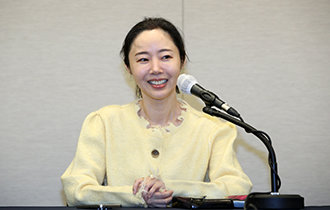No populist pledges from new ministers
Strategy and Finance Minister Park Jae-wan, Land, Transport and Maritime Affairs Minister Kwon Do-yeop, Employment and Labor Minister Lee Chae-pil, and Food, Agriculture, Forestry and Fisheries Minister Seo Kyu-yong will take office Thursday. These new economy-related Cabinet members should prevent politicians who will run in next year`s presidential and general elections from presenting populist pledges. If the ruling and opposition parties race to pour out populist pledges without considering national fiscal standing and the burden the next generation will bear, this will threaten the basis of stable economic growth and result in financial trouble. Koreas financial status is rapidly weakening. Though economy-related ministers have no authority to ban the ruling and opposition parties from presenting pledges, they must warn politicians of the adverse effects of reckless election pledges and present alternatives. Though the next government will suffer the consequences of reckless pledges, the incumbent administration should do its best to take preventive measures.
President Lee Myung-bak has repeatedly warned of populism rearing its ugly head in elections. In the wake of the ruling Grand National Partys crushing defeat in the April 27 by-elections, however, he is doing nothing about the policy drive to halve college tuition as pursued by ruling party floor leader Hwang Woo-yeo. The government must verify the validity of the policy. On the drastic tuition reduction, outgoing Strategy and Finance Minister Yoon Jeung-hyun, who leaves offices Wednesday, has repeatedly said, Relevant ministries must take the responsibility of banning the enactment of laws that need government budget.
An association on the supervision of populist legislation comprising 33 civic groups, including the Center for Free Enterprise, will urge lawmakers to pledge not to enact populist and tax-wasting laws. At a seminar hosted by the association Monday, Min Gyeong-guk, an economics professor at Gangwon National University, said, The Lee administration is defying the free market economic system by controlling the prices of basic necessities and pursuing working class-friendly policies, simultaneous growth between large and smaller companies, pork-barrel welfare policies, and a fair society, instead of reforming service industries such as medical care and education. Lee Yeong, a professor at Hanyang University, also warned of populist policies, saying, Many countries have failed to become advanced due to welfare systems not in line with their socio-economic development. Kim Jin-seong, who leads a campaign to develop education, said, In the era of the low birth rate and rapidly aging population, we shouldn`t let our future generations bear the burden of wrong welfare policies.
The Greek sovereign debt crisis is largely due to reckless welfare spending. Fiscal problems of European countries such as Portugal, Italy, Ireland, Greece and Spain underscore the importance of fiscal soundness.
In Korea, politicians are poised to pour out populist policies such as free school meals, medical care and childcare in the run-up to the presidential and general elections next year. Fiscal soundness is critical to preparation for not only an aging society but also reunification of the Korean Peninsula. The government needs to create an expert-led verification system for welfare policies that require huge amounts of national budget.






